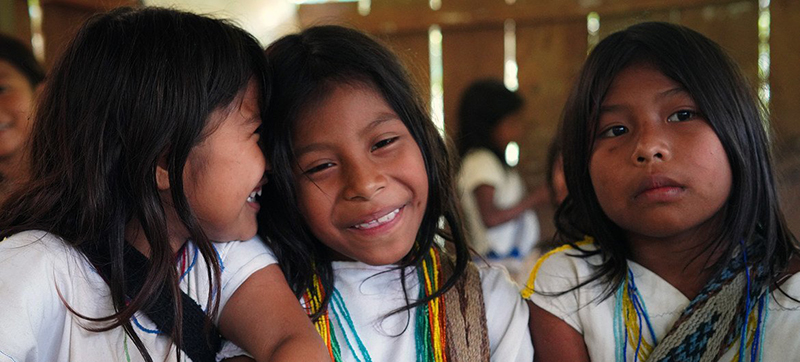 Indegeneous Language
Indegeneous Language
UN launches 10-year survival plan for endangered indigenous languages
New York: From Arctic communities desiring to receive public services in their own languages, to the Arhuaco people in Colombia who still speak Ika, indigenous people across the world are determined to keep their mother tongues alive.
On Friday, the UN launched the International Decade of Indigenous Languages to help them survive, and protect them from extinction.
The Organization has long advocated for indigenous peoples, who are the inheritors and practitioners of unique cultures and ways of relating to people and the environment.
A benefit for all
Preserving their languages is not only important for them, but for all humanity, said the President of the UN General Assembly, Csaba Kőrösi.
“With each indigenous language that goes extinct, so too goes the thought: the culture, tradition and knowledge it bears. That matters because we are in dire need of a radical transformation in the way we relate to our environment,” he said.
Indigenous people make up less than six per cent of the global population but speak more than 4,000 of the world’s roughly 6,700 languages, according to the UN Department of Economic and Social Affairs (DESA).
Alarm bells ringing
However, conservative estimates indicate that more than half of all languages will become extinct by the end of this century.
Mr. Kőrösi recently returned from the UN Biodiversity Conference in Montreal and left convinced that “if we are to successfully protect nature, we must listen to indigenous peoples, and we must do so in their own languages.”
Indigenous peoples are guardians to almost 80 per cent of the world’s remaining biodiversity, he said, citing data from the UN Food and Agriculture Organization (FAO).
“Yet every two weeks, an indigenous language dies,” he remarked. “This should ring our alarms.”
The General Assembly President urged countries to work with indigenous communities to safeguard their rights, such as access to education and resources in their native languages, and to ensure that they and their knowledge are not exploited.
“And perhaps most importantly, meaningfully consult indigenous peoples, engaging with them in every stage of decision-making
More than words
During the launch, indigenous persons and UN Ambassadors – sometimes one and the same - made the case for protection and preservation.
Language is more than just words, said Mexican Ambassador Juan Ramón de la Fuente, speaking on behalf of the 22-member Group of Friends of Indigenous Peoples.
“It is at the essence of the identity of its speakers and the collective soul of its peoples. Languages embody the history, culture and traditions of people, and they are dying at an alarming rate,” he warned.
Cultural identity and wisdom
Leonor Zalabata Torres, an Arhuaco woman and Colombia’s UN Ambassador, drew applause for her address, delivered partly in Ika, one of 65 indigenous languages spoken in her homeland.
“Language is the expression of wisdom and cultural identity, and the instrument that gives meaning to our daily reality that we inherited from our ancestors,” she said, switching to Spanish.
“Unfortunately, linguistic diversity is at risk, and this has been caused by the dramatic reduction of the use and the accelerated replacement of indigenous languages by the languages of the majority societies.”
Ms. Zalabata Torres reported that the Colombian government has underlined its commitment to implementing the 10-year plan on indigenous languages, which is centred around pillars that include strengthening, recognition, documentation and revitalization.
Language and self-determination
For Arctic indigenous communities, language is critical to political, economic, social, cultural and spiritual rights, said representative Aluki Kotierk.
“In fact, every time an indigenous person utters a word in an indigenous language, it is an act of self-determination,” she added.
However, Ms. Kotierk said native tongues and dialects “are in various levels of vitality”.
She envisions a time where Arctic indigenous peoples “can stand taller in their own homelands with dignity, knowing that they can function in all aspects of their lives, in their own language, receiving essential public services in the areas of health, justice, and education.”
Towards linguistic justice
Mariam Wallet Med Aboubakrine, a doctor from Mali, advocates for indigenous peoples in Africa, particularly the Tuareg.
She urged countries “to deliver linguistic cultural justice to indigenous peoples”, which will only contribute to reconciliation and lasting peace.
She expressed hope that the International Decade will culminate with the adoption of a UN Convention “so that every indigenous woman can cradle and comfort her baby in her language; every indigenous child can play in their language; every young person and adult can express themselves and work in security in their language, including in digital spaces, and to ensure that every elder can transmit their experience in their language.”
Support Our Journalism
We cannot do without you.. your contribution supports unbiased journalism
IBNS is not driven by any ism- not wokeism, not racism, not skewed secularism, not hyper right-wing or left liberal ideals, nor by any hardline religious beliefs or hyper nationalism. We want to serve you good old objective news, as they are. We do not judge or preach. We let people decide for themselves. We only try to present factual and well-sourced news.







